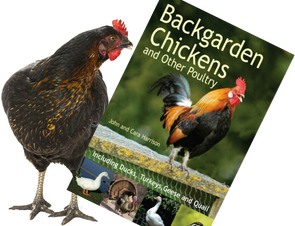A very quick blog post to wish you all a Happy New Year! I also had a couple of emails asking about the current Avian Flu situation so thought I’d give a quick recap of where we stand for those who are wondering.
The chickens may still be in lockdown, but from recent emails I’ve been receiving it seems many readers are spoiling their flocks to make up for it. Special Christmas Day porridge seemed a favourite and I’m pretty sure our girls would be rather jealous of this as I’m afraid all they have had is some extra greens! Our chard is still growing strong which is giving us a plentiful source of Winter greens for the girls.
Even if you only have a small garden, or even a large pot, chard is easy to grow and Winter hardy in the UK. For us it is the perfect Winter crop for both us and the girls until those Spring goodies start to come through. If you fancy giving it a grow John’s Growing Swiss Chard (Spinach Beet) – How to Grow Swiss Chard guide should help you on your way.
Current Avian Flu Restrictions UK January 2021
There have been no updates on the Avian Flu situation bar that restrictions remain in place. It is a good idea at the moment to keep an eye on the Government Website to make sure there are no local additional restrictions or zones in place. I also noticed that they have updated their Avian Flu Posters to give better guidance for home keepers as well. The simple guidance at present is:
- Keep your chickens and turkeys housed.
- If you do not have purpose built housing you could use a garden shed or polytunnel, as long as there is adequate light, space and ventilation.
- Ensure there are no leaks or other forms of water ingress to the building.
- Seek guidance from your vet if you have concerns regarding your birds’ health and welfare needs due to the new housing requirements.
- If it is impossible for you to completely house your birds, you must separate them from wild birds. Provide an enclosure or temporary structure that is fully netted (holes no greater than 2-5cm diameter). If there are any gaps in your housing where wild birds could get in, block them, or cover with netting.
- Partially enclosed birds must be kept separate from any fully house birds.
- Feed and water must be provided indoors or undercover.
- Store bedding inside to reduce the risk of contamination.
- Make your entire premises unattractive to wild birds. Use bird scarers, foils or streamers.
- Cleanse and disinfect footwear before and after tending to your birds. If you own more than 50 birds, you must place foot dips containing government approved disinfectant, at the correct dilution rate, at all entry and exit points. This is also advised for less than 50 birds.
- Clean and disinfect hard surfaces regularly.
- Clean and disinfect equipment and vehicles to avoid disease spread between premises.
- Minimise the movement of people, vehicles and equipment to and from bird areas and keep records of movements.
- You must keep records of movement of poultry, captive birds and eggs. This is in addition to the usual rules on recording bird deaths and medicine usage when you check your birds.
I hope that helps and I’ll be back with a full blog post review later this month of the new Omlet Chicken Pole which is great for keeping your flock “hentertained” and dry footed through the Winter months.



Leave a Comment Here on Happy New Year!